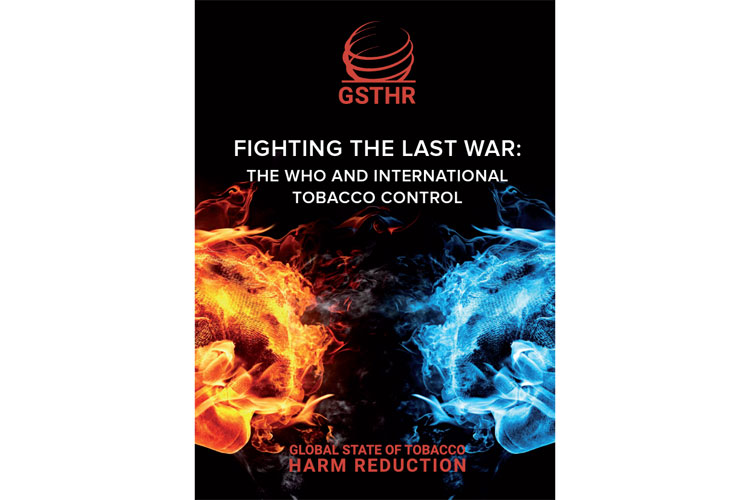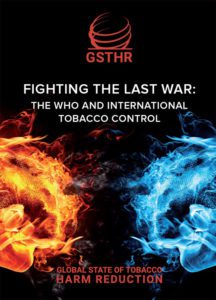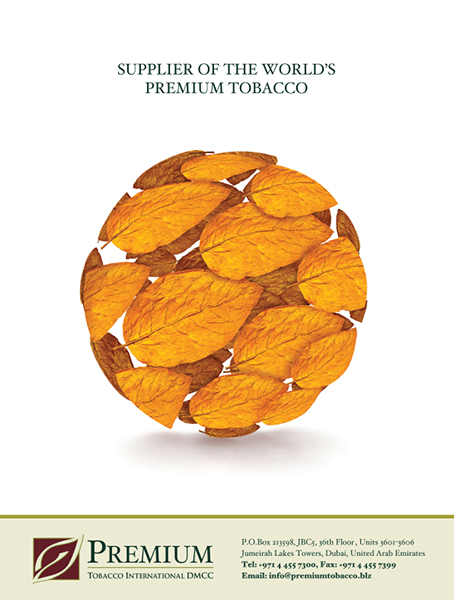Fighting the Last War
- Also in TR Harm Reduction Print Edition
- December 1, 2021
- 0
- 0
- 13 minutes read

A new report by Knowledge-Action-Change urges the World Health Organization to embrace safer nicotine products.
By George Gay
 On the face of it, it seems odd that a case has to be made for the promotion of safer nicotine products (SNPs) as part of a global tobacco harm reduction (THR) strategy. But making this case, in large part, is the aim of a report published by the U.K.-based public health agency Knowledge-Action-Change (KAC) and launched at a hybrid event on Oct. 27 in London. And it has to be said that the case needs to be made, as becomes clear toward the end of the report, in a section looking toward the future, where it is stated that it is a “moral imperative” that the World Health Organization and its allies retrench from their current “intransigent and obstructive position of not only refusing to accept any positive health benefits from SNPs but actively campaigning against their use.”
On the face of it, it seems odd that a case has to be made for the promotion of safer nicotine products (SNPs) as part of a global tobacco harm reduction (THR) strategy. But making this case, in large part, is the aim of a report published by the U.K.-based public health agency Knowledge-Action-Change (KAC) and launched at a hybrid event on Oct. 27 in London. And it has to be said that the case needs to be made, as becomes clear toward the end of the report, in a section looking toward the future, where it is stated that it is a “moral imperative” that the World Health Organization and its allies retrench from their current “intransigent and obstructive position of not only refusing to accept any positive health benefits from SNPs but actively campaigning against their use.”
I would agree wholeheartedly with the general sentiment being expressed here, but invoking morality is problematic, I believe. The idea of an overarching morality is not universally accepted because a lot of people believe “morality” resides in the preferences individuals or groups of people have. And, in fact, Harry Shapiro, the author of the report Fighting the Last War: The WHO and International Tobacco Control, seemed to acknowledge this point when, speaking at the launch, he said everybody working in tobacco control was aiming to reduce smoking but that tobacco control split into two broad camps: one comprising those who supported SNPs and THR and the other comprising those who didn’t. This was a good concession to make because having the word “war” in the title of the report seemed to be pointing us back down a road we surely don’t want to travel.
Misguided and Irrational
Having said that, this is a good report aimed at challenging the direction of travel of tobacco control under the auspices of the WHO’s Framework Convention on Tobacco Control (FCTC) ahead of the Conference of the Parties to the FCTC, COP9, which was due to take place virtually on Nov. 8–13 (after this report was written). In doing so, the report seeks to address what must surely be one of the most unsound and unreasoned strategies ever to have arisen within the international health community. Put briefly, it is about the WHO and its allies being not immoral but, more worryingly, misguided and irrational.
According to the WHO, an epidemic of cigarette smoking is currently causing the deaths of 8 million people a year, usually referred to as “premature deaths,” a phrase up there with “pre-ordering” in the list of linguistic curiosities. But while a number of SNP products have been developed that can wean people off tobacco smoking, the most powerful international body charged with protecting the health of people around the world has decided it would be best not to use these products but to apply the old “quit-or-die” patch to the gaping wound. After all, quit-or-die has a long track record whereas the products being offered up are—mention it only in hushed tones—new or newish. The fact that the long track record of quit-or-die is, like the art of bleeding patients, one largely comprising failure seems not to enter the thinking of the WHO and its allies.
But perhaps this isn’t fair. The report makes the point that the number of smokers worldwide has remained at 1.1 billion for the past 20 years, during which time, I understand, the world’s population rose from 6.11 billion to 7.75 billion, so it could be argued that the number of smokers would, without intervention and with all other things having remained equal, have risen to 1.38 billion. So what has occurred might not be failure, I guess, but it is hardly a galloping success.
Of course, it might be said correctly that individuals and states are not bound to follow the WHO’s advice, but it is often the case that they do, perhaps because of the peculiar tendency of humans to create or invent institutions or belief systems and then slavishly accept the advice purportedly coming out of them, no matter how daft, rather than go back and question whether there was a fault in the original idea that gave rise to the institution or belief system.
But I would not recommend going back to question the setting up of the WHO itself, which, to my mind, should be a powerful force in the global fight against transmissible diseases, but to question the WHO’s FCTC, whose provisions are used to steer the direction of travel of the international tobacco control movement.
A Matter of Interpretation

The report does an excellent job of explaining the roles of the WHO, the FCTC, the Conference of the Parties to the FCTC and the FCTC secretariat, the relationship between them and the decision-making processes they employ. This section of the report doesn’t make encouraging reading, however, though it largely defends the FCTC’s provisions and blames the way they are interpreted for the failure to embrace SNPs and THR. It is said that the provisions of the FCTC are no bar to the consideration of scientific advances, new technologies, economic circumstances and the concept of THR. But this is surely no reason to keep heading down the same road hoping things are miraculously going to get better, especially given that the seemingly unaccountable FCTC secretariat is making much of the running, and nation states tend to go with the flow, unlike when they discuss other global issues such as trade. There have been eight FCTC-based COP meetings since the COP first met in 2006, and I cannot help thinking that, given the lack of progress it has made in 15 years of working with the FCTC, the decent thing to do would be to put the COP and the FCTC out of their misery.
One of the problems identified in respect of COP meetings is that they are almost totally exclusive, owing to a particular interpretation of an FCTC provision. And a comparison is made in the report, and was repeated by others at the report launch, of the FCTC COP meetings and those associated with the Framework Convention on Climate Change (FCCC). The tobacco COPs were said to be shrouded in a level of secrecy comparable to U.N. Security Council meetings whereas to be an observer at the FCCC COP, it was necessary only to demonstrate representation of a national or international body and relevant experience. The inference was that if more people were allowed to observe and even take part in the tobacco COP, things would be better.
I hate to spoil the party here, but the comparison is a little out of proportion, to my way of thinking. Tobacco COPs look at consumer choices involving various tobacco and nicotine products whereas the FCCC COPs are about trying to prevent the whole of humankind going belly up. The comparison seems also to gloss over the evidence. As I write this, the FCCC COP, COP26, is about to start and is widely expected to end largely in a PR-burnished failure, with the result that the world will be plunged deeper into the existential crisis it is already in and from which it is unlikely to be able to row back. Having more participants doesn’t seem to guarantee success, at least not on its own, even where the fate of the earth hangs in the balance.

The Way Forward
So, how could things be arranged to ensure a more beneficial outcome to the problem of tobacco smoking? Well, through the employment of THR, where harm reduction is defined in the report as “a range of pragmatic policies, regulations and actions that either reduce health risks by providing safer forms of products or substances or encourage less risky behaviors with an important role in championing social justice and human rights for people who are often among the most marginalized in society.” One of the most frustrating aspects of the refusal of the WHO and parties to the FCTC to embrace THR is that the WHO employs harm reduction in respect of other health issues. Such an inconsistent stance is difficult to understand, but then perhaps there is a visceral satisfaction in bleeding the patient, either actually or metaphorically, through taxation, the main weapon in the quit-or-die armory. Increasing tobacco taxation is held up as a quit-or-die success story, but, in fact, it is a strategy that further impoverishes the often less well-off while providing a boost for black marketers.
Under a section titled “What can be done? New thinking for the 21st century,” it is said that parties to the FCTC should press for more evidence-based discussions on THR and SNP. This is a nice thought, but given the history laid out in the report, I wonder if it can lead anywhere helpful. I’m sure COP participants believe they are making evidence-based decisions already, but my guess is, to get back to my original point, they are viewing only the evidence that is able to squeeze through their locked-in “moral” filters. The more alcohol they quaff together, the more they come together in the belief that nicotine is evil and shouldn’t be enjoyed. Evidence is no guarantor of success. The EU’s deadly ban on snus, a ban that defies all reason, has been upheld in the courts.
Under the same section, it is said also that a pragmatic route forward could be the establishment of a working group on THR to take the FCTC forward into the 21st century in a world where SNPs are now available. This, too, is a good thought, but again, given the history laid out in the report, one that might be difficult to pull off. Still, nothing ventured, nothing gained, and the report describes five ways in which such a working group might be able to move things forward.
One of the key starting points is said to be disaggregating combustible and more dangerous oral tobacco products from safer noncombustible products. But is this likely when, in a world where we hang onto the belief that the U.S. Food and Drug Administration is the paragon of scientific reason, that agency feels it right, and has the right, to “deem” electronic cigarettes to be tobacco products?
It is easy to become gloomy about the situation, especially when it is considered that even if a smoker is saved from a tobacco-related death through switching to an SNP, she is anyway more likely now to die of a pollution-related disease (for which there is no COP), or, slightly further into the future, the effects of a climate change event.
But, looking on the bright side, there is a powerful and growing force in support of THR, and it was on display at an event in London on the day following the launch of the Fighting the Last War report. The THR scholarship program, which is described as the jewel in the crown of the KAC, was the subject of a separate report, Tobacco Harm Reduction Scholarship Program: The First Three Years 2018–2021, which describes how the program has built an extensive network of advocates raising awareness of THR around the world.
The report is worth reading. Although I was aware of the program, I had no idea how extensive it had become. Since its launch, the program has attracted 260 applications and has taken on 75 scholars from 33 countries, 18 of whom have gone on to enhanced scholarships. But perhaps the most significant figures are those describing how 95 percent of the scholars are still working in THR, 27 percent full-time, 50 percent part-time and 18 percent on a voluntary basis.
The Oct. 28 event was an opportunity also to celebrate the life of Kevin Molloy (1957–2021), who, from 2018 until earlier this year, was head of the scholarship program.
The Fighting the Last War report, which is part of a series of Global State of Tobacco Harm Reduction reports from KAC, and the scholarship program are funded by grants from the Foundation for a Smoke-Free World, a U.S. nonprofit organization that had no role in the planning or execution of either project.


